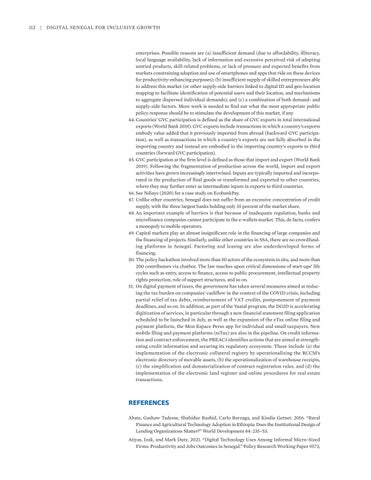112
| Digital Senegal for Inclusive Growth
enterprises. Possible reasons are (a) insufficient demand (due to affordability, illiteracy, local language availability, lack of information and excessive perceived risk of adopting untried products, skill-related problems, or lack of pressure and expected benefits from markets constraining adoption and use of smartphones and apps that ride on these devices for productivity-enhancing purposes); (b) insufficient supply of skilled entrepreneurs able to address this market (or other supply-side barriers linked to digital ID and geo-location mapping to facilitate identification of potential users and their location, and mechanisms to aggregate dispersed individual demands); and (c) a combination of both demand- and supply-side factors. More work is needed to find out what the most appropriate public policy response should be to stimulate the development of this market, if any. 44. Countries’ GVC participation is defined as the share of GVC exports in total international exports (World Bank 2019). GVC exports include transactions in which a country’s exports embody value added that it previously imported from abroad (backward GVC participation), as well as transactions in which a country’s exports are not fully absorbed in the importing country and instead are embodied in the importing country’s exports to third countries (forward GVC participation). 45. GVC participation at the firm level is defined as those that import and export (World Bank 2019). Following the fragmentation of production across the world, import and export activities have grown increasingly intertwined. Inputs are typically imported and incorporated in the production of final goods or transformed and exported to other countries, where they may further enter as intermediate inputs in exports to third countries. 46. See Ndiaye (2020) for a case study on EcobankPay. 47. Unlike other countries, Senegal does not suffer from an excessive concentration of credit supply, with the three largest banks holding only 35 percent of the market share. 48. An important example of barriers is that because of inadequate regulation, banks and microfinance companies cannot participate in the e-wallets market. This, de facto, confers a monopoly to mobile operators. 49. Capital markets play an almost insignificant role in the financing of large companies and the financing of projects. Similarly, unlike other countries in SSA, there are no crowdfunding platforms in Senegal. Factoring and leasing are also underdeveloped forms of financing. 50. The policy hackathon involved more than 50 actors of the ecosystem in situ, and more than 200 contributors via chatbot. The law touches upon critical dimensions of start-ups’ life cycles such as entry, access to finance, access to public procurement, intellectual property rights protection, role of support structures, and so on. 51. On digital payment of taxes, the government has taken several measures aimed at reducing the tax burden on companies’ cashflow in the context of the COVID crisis, including partial relief of tax debts, reimbursement of VAT credits, postponement of payment deadlines, and so on. In addition, as part of the Yaatal program, the DGID is accelerating digitization of services, in particular through a new financial statement filing application scheduled to be launched in July, as well as the expansion of the eTax online filing and payment platform, the Mon Espace Perso app for individual and small taxpayers. New mobile filing and payment platforms (mTax) are also in the pipeline. On credit information and contract enforcement, the PREAC3 identifies actions that are aimed at strengthening credit information and securing its regulatory ecosystem. These include (a) the implementation of the e lectronic collateral registry by operationalizing the RCCM’s electronic directory of movable assets, (b) the operationalization of warehouse receipts, (c) the simplification and dematerialization of contract registration rules, and (d) the implementation of the e lectronic land register and online procedures for real estate transactions.
REFERENCES Abate, Gashaw Tadesse, Shahidur Rashid, Carlo Borzaga, and Kindie Getnet. 2016. “Rural Finance and Agricultural Technology Adoption in Ethiopia: Does the Institutional Design of Lending Organizations Matter?” World Development 84: 235–53. Atiyas, Izak, and Mark Dutz. 2021. “Digital Technology Uses Among Informal Micro-Sized Firms: Productivity and Jobs Outcomes in Senegal.” Policy Research Working Paper 9573,



